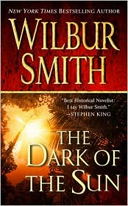
In honor of the American Library Association’s Banned Books Week 2010, which starts today, here is a special roundup of banned book news, and a comment on Wilbur Smith’s The Dark of the Sun.
Wondering which ten books drew the most fire over the past year? Here’s your answer.
Corrected entry (see comment below post): Conservative groups who believe in and fear the so-called gay agenda accuse the American Library Association of suppressing books with pro-hetereosexual themes. But 99% of books in libraries implicitly or explicitly endorse heterosexuality, so what’s really going on? Sounds to me like the groups are upset with the ALA for refusing to recognize, catalog, and shelve their religious tracts as literature.
Just to be contrary, here are some books we maybe ought to ban. Personally, I’d start with the Bible, the Koran, and the Torah . . . haven’t they caused enough bloodshed already?
Speaking of things that ought to be banned, how about childrens’ Saturday morning cartoons that really amount to little more than product placement?
Here’s an interesting bit of American book-banning history featuring Utah Senator Reed Smoot, he of Smoot-Hawley Tariff fame.
Ah, Missouri . . . my home state never loses its ability to embarrass me.
What if, instead of banning books, we bowdlerize them instead? Oops, turns out that doesn’t work very well.
As promised, my reaction to Wilbur Smith’s The Dark of the Sun:
 A friend loaned me this paperback novel by Wilbur Smith, telling me I’d love it. Smith, who’s been cranking ’em out since the mid-1960s, is a Rhodesian-born writer of historical adventure & intrigue novels. A perennial denizen of international best-seller lists, he’s a man with a gift for the ripping yarn.
A friend loaned me this paperback novel by Wilbur Smith, telling me I’d love it. Smith, who’s been cranking ’em out since the mid-1960s, is a Rhodesian-born writer of historical adventure & intrigue novels. A perennial denizen of international best-seller lists, he’s a man with a gift for the ripping yarn.
But Wilbur Smith, at least in his early novels, writes as a man of his time and place, with notions and prejudices shaped by his upbringing in white-ruled apartheid Rhodesia. The Dark of the Sun, published in 1965, was his second novel (he’s now up to 33).
I am but 50 pages into this 282-page paperback, and have already encountered the following echoes of times past:
- ‘Jesus!’ growled Wally Hendry from the bed. ‘I’ve had just about a gutsful of this nigger army.’ – page 1
- ‘After three months of fighting a bunch of greasy little Gurkhas I was looking forward to a bit of fun . . . ‘ – page 2
- ‘Shut up, damn you,’ Bruce roared and swung his open hand against the head of the gendarme beside him, but the man hardly noticed it. His eyes were glazing with the infectious hysteria to which the African is so susceptible; he had snatched up his rifle and was holding it across his chest; already his body was beginning to jerk convulsively as he chanted. – page 25
The Dark of the Sun, I think it safe to say, is an artifact of a particular place and time. But so are Mark Twain’s The Adventures of Huckleberry Finn and Harper Lee’s To Kill a Mockingbird, two books that to this day continue to be challenged by parents wanting them removed from school libraries and assigned reading lists, parents who object to the same sort of offensive and insensitive references I’m finding in Wilbur Smith’s book.
So why do we never hear of challenges to the early novels of Wilbur Smith . . . or, for that matter, the mysteries of Agatha Christie, a racist snob whose anti-semitism frequently found its way into her early work?
Because, I suppose, Wilbur Smith and Agatha Christie wrote popular fiction, and popular fiction is considered too lowbrow for school reading lists. Yet their books — and their discredited ideas — are everywhere and still widely read. This says something about the futility of banning ideas by banning books, does it not?
The entry I corrected today was based on a quick reading of the linked article, which I initially thought endorsed the conservative groups’ accusations against the ALA. The author contacted me and said that was not her intent … rather, she was describing the controversy, not taking sides. I reworded the entry to make that clear.